Prices in red-hot Dallas slow. Chicago condos flat for the year. Formerly crushed Detroit up 100% in 7 years. Cleveland struggles out of crushed status.
Yesterday, we did The Most Splendid Housing Bubbles in America — such as the San Francisco Bay Area, New York City metro, the Miami metro, Seattle, and other markets that have or had mind-bending house-price bubbles. Today, we do the other markets in the 20-city CoreLogic Case-Shiller Home Price Index – the cities where house prices have not yet doubled since 2000.
Dallas-Fort Worth House Prices:
In the Dallas-Fort Worth metro – the counties of Collin, Dallas, Delta, Denton, Ellis, Hunt, Johnson, Kaufman, Parker, Rockwall, Tarrant, and Wise – the blistering house price boom of the past seven years is slowing. In August, prices of single-family houses remained flat with July, and are up only 2.8% from August last year, according to the CoreLogic Case-Shiller Home Price Index. “Only 2.8%” because between the end of 2012 and mid-2018, year-over-year price increases ranged from 5% to over 10%; the first time since 2012 that year-over-year price increases dropped below 3% was in April 2019:
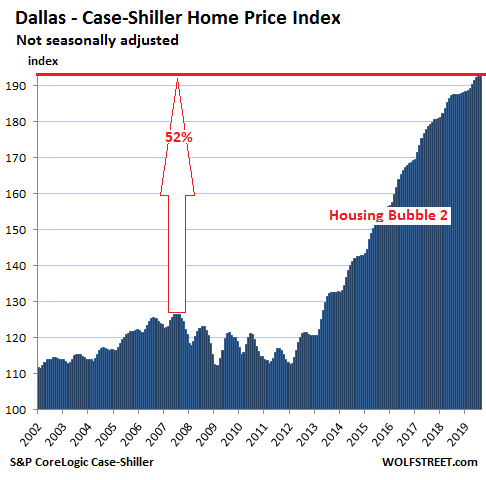
The Case-Shiller Index is a rolling three-month average. This release represents closings that were entered into public records in June, July, and August.
The charts here are on the same scale, with the vertical axis going from 100 to 195, to make price movements easier to compare from market to market. The exception is Detroit. We’ll get to that in a moment. As you go down the list of cities, house price increases are smaller and smaller, compared to Dallas; and so the white space above the curve increases.
Minneapolis house prices:
House prices in the Minneapolis metro ticked up 0.2% in August from July, to a new record, for a year-over-year gain of 3.9%. The index now exceeds the peak of Housing Bubble 1 by 5.5%. Note the slightly larger white space above the peak of the curve, compared to Dallas:
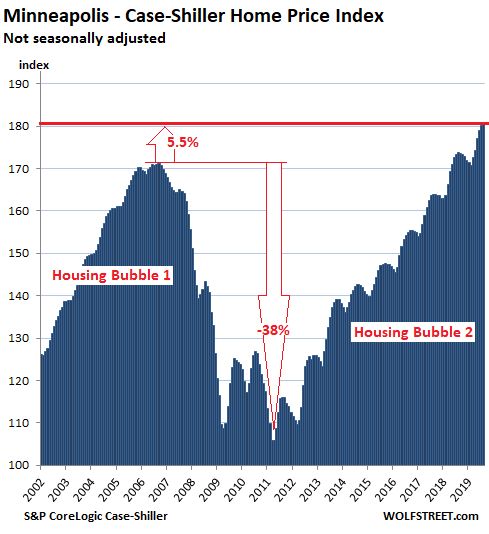
Chicago House Prices:
Prices of single-family houses in the Chicago metro ticked up 0.1% in August from July, which whittled down the gain compared to August last year to 1.6%. The CoreLogic Case-Shiller Home Price Index includes in the Chicago metro the counties of Cook (where the City of Chicago is), DeKalb, Du Page, Grundy, Kane, Kendal, McHenry, and Will. The index is still down nearly 13% from the crazy peak during Housing Bubble 1:
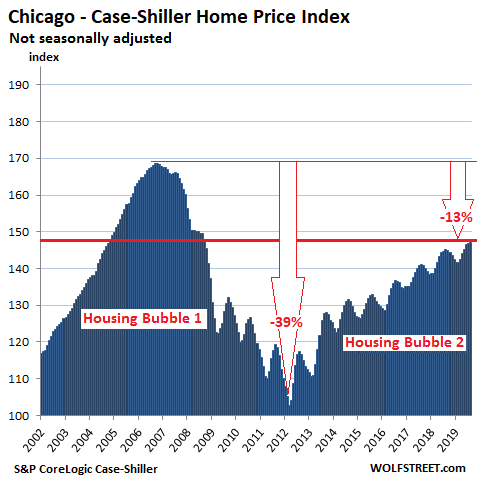
Chicago Condo Prices:
Condo prices declined 0.2% in August from July, the second month in a row of declines, after a flat reading in June, which whittled down the year-over-year gain to just 0.4%:
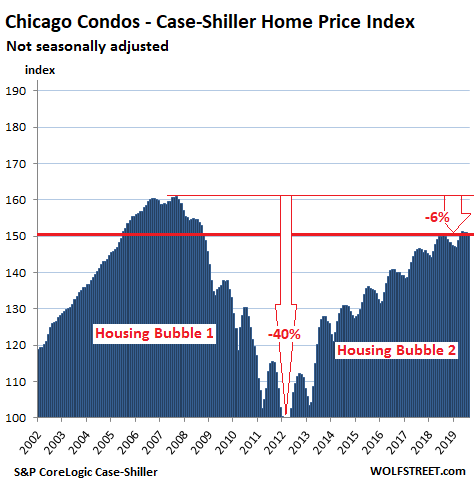
Charlotte house prices:
House prices in the Charlotte metro edged up 0.1% in August from July and were up 4.5% year-over-year, still progressing with its price boom that started in early 2012:
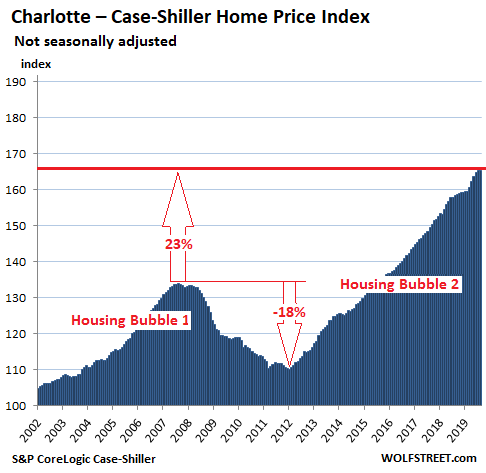
Atlanta house prices:
House prices in the Atlanta metro edged up 0.2% in August compared to July, leaving the year-over-year gain at 4.0%, the smallest such gain since September 2012, when Atlanta emerged from Housing Bust 1, during which the Case-Shiller index had plunged 40% and in early 2012, hit a value of 82.5, a level first seen in 1996:
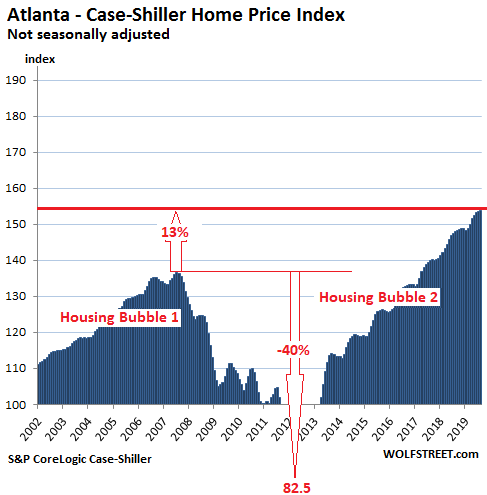
Detroit house prices:
House prices in the Detroit metro – the counties of Lapeer, Livingston, Macomb, Oakland, Saint Clair, and Wayne which includes the City of Detroit – inched up 0.1% in August from July and are up 3.8% year-over-year, hitting an all-time record for the fourth month in a row, surpassing by 1.9% the old high of December 2005.
To show how far prices plunged from already low-ish level during Housing Bust 1, and to what extent they have soared since hitting bottom – namely 100% – I have extended the scale down to start at 60 instead of 100. This additional part of the chart is marked by the shaded area:
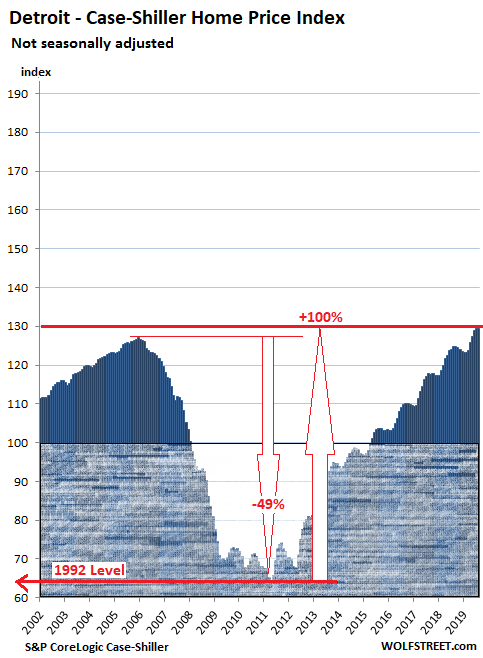
Cleveland house prices:
House prices in the Cleveland metro ticked up 0.3% in August from July and were up 2.9% year-over-year, setting a new record for the fourth month in a row, now up 3.4% from the old record of 2006:
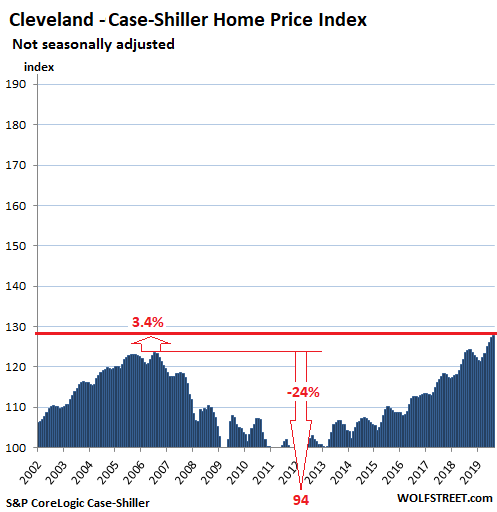
Since January 2000, the Case-Shiller Index for Cleveland has risen 28%, the smallest such increase among the 20 metros covered by the Case-Shiller Index, and below Detroit’s gain of 29%. The record percentage-increases among the 20 metros in the Case-Shiller Index is held by the Miami metro, where prices skyrocketed 193% between January 2000 and December 2006, before collapsing. The record percentage-increase for the period from January 2000 through August 2019 is held by the Los Angeles metro, where prices surged by 186%.
Despite startup millionaires, house & condo prices in San Francisco Bay Area and condo prices in New York City fall from a year ago. Seattle is down again. Los Angeles, Las Vegas lose steam. Phoenix, others are running hot. Read… The Most Splendid Housing Bubbles in America, October Update
Enjoy reading WOLF STREET and want to support it? You can donate. I appreciate it immensely. Click on the mug to find out how:
![]()


Wolf,
Are these realtors inputting the data or government?
The realtors in Canada are doing a whole host of manipulation…
From holding back condo listings off the books to fake overlist price wars.
This Case-Shiller data is based on public records data. So when a sale is completed and entered into the public records, the Case-Shiller picks it up and throws it into the mixer.
You just have to wonder, I mean how long has Shiller been around?
I can remember some 30+ years ago at the county recording offices watching old lady’s work for these folks pulling country records and entering into their ledgers, so all this ‘public data’ could be digitized.
But as we see with S&P, and all the other 2007 rating’s agency’s, how many can be trusted? How long can you not bite the hand that feed’s you? Sure shadow-stats is still trusted by contrarians, but shiller is huge these days
….
Funny that Chicago is up, funny that stuff there sells for less than the property taxes due on an annual basis.
First they move Boeing to Chicago, and now Molson-COORS has announced they’re moving HQ to Chicago. What’s Up? I thought Illinois is/was toxic? R they giving their people free housing and policing?
Lastly, the model is Detroit. Where annual taxes exceed the value of the property, as ‘ownership’ in USA just means your renting your house from the local gov, and most places I know of take a 5% cut of the sale, if&when you do sell, so they actually want people to flip. In Calif they’re desperate to get property’s to flip, so the house can rollover prop-13.
Wow I didn’t realize Dallas did so well during this boom. Makes sense I guess since they more or less missed out on the 90s and 00s appreciation. Lots of catching up.
The DFW area has landed dozens of large corporations in the last decade. Lots of companies are relocating here from CA and NY and it’s bringing a much higher paying type of worker here. Home prices for what you get are still crazy affordable but the gains are driven more by the proliferation of high end housing.
I have learned, some realtors in the N. Dallas area will go ahead and purchase the home WITHOUT putting up a “for sale” sign, just to get the owners out, and then come in, remodel and stage it better, with a REAL for sale sign at a much higher price. Well, I think that is starting to back fire as well. I’m seeing more homes in the Aubrey area just sitting with a sign out front for 2 months or more. Builders are sending us reduced prices on NEW homes 15,000 to 25,000 off of list price. So YES finally its slowing.
Aubrey is a long way from Dallas.
But Aubrey is close to a half-million people and their jobs. We lived in Denton for a while and rarely needed to go into either D or FW except for concerts.
Interesting to see that the Chicago market is still down 13% and never broke even. When the teachers strike and pension funds result in raised property taxes there should be a “rebound” even lower. Who will buy there?
Everything clears at a market price. But with taxpayers in that area on the hook for $100Ks per household, the market clearing price may be a *lot* lower than the owners expect.
Well that begs the question, why is Coors moving HQ from Colorado to Chicago ( announced today )?
Me thinks that Chicago must be offering some astronomic tax incentives to these companys to move there, otherwise why in hell?
Who will buy, well its obvious, if they continue to move the last standing USA corporate HQ to Chicago, then it could be the only place that has employed people, who need housing, and have the cash flow to pay mtg&taxes.
I just sold a condo in Rogers Park in the city of Chicago. Pension funds for teacher, fire fighters and other city employees are at risk. For every recipient of pension funds there is only 1.5 workers paying into the fund. Taxes are high and will be going higher. Taxes on a reasonable home or townhouse in Chicago will cost your budget $3,000 to $4,000 per month and a a really nice house is double that amount.
To borrow a coined phrase, nothing bubbles up in a straight line. Predicting a bubble pop is inconsistent with logic. Any minor decline seen is merely a small bumpsm along the way to even bigger bubbles because nothing bubbles higher in a straight line. With Powell’s hawkish dovism today essentially ruling out ANY rate increase – forever (if you get he’s trapped inside his own inflation fraud box) equity inflation is here to stay. Just not in a straight line.
No inflation. Cost of living (real per capita PCE) is up 200% in the last 60 years. Real wages for 70% of employed Americans up 15%. But no inflation.
Rodchester N.Y. probably looks a lot like Cleveland too!
Must say the Chicago graph looks like someone drawing the outlines of trees on the side of a hill!
No other city’s graph looks as bumpy as Chicago’s!
I was floored when I saw how cheap Rochester is. You can still buy a livable house for $150K.
$500K buys you a 4000 sq ft home on a huge lot, in the best part of town.
Random Guy, you don’t know know the area if you believe that. You can’t buy a livable house for $150K here. The entire city of Rochester is unlivable, even the nicer pocket of the Park Ave area is overrun with college students. I should know, we owned a house there for 10 years and got out while we could. All the homes are dilapidated, built in the very early 1900s, with electrical and plumbing that’s been cobbled together. The houses are also way too close together with postage stamp yards. The areas people actually want to live are the surrounding suburbs, but even there, the newest homes are from the 1960s, at best. You’re lucky to find anything decent below $250K but be prepared to spend closer to $300K or more if you want something that doesn’t need a lot of work in one of the nicer areas. Also, keep in mind that the median income here is only about $30K. UR is the largest employer and doesn’t pay well, although slightly better than any other company around. All of Rochester, NY and the surrounding areas are very depressed after Kodak, Xerox, and Bausch & Lomb all but shuttered in the 1990s, and it’s never come back from that.
I graduated from R.I.T. In the late 80s. When it came to finding the post college job, there was one area I knew I wasn’t going to be looking: anything north of and including Buffalo: Rochester: Syracuse
Weather is just horrible and Couple that with the above mentioned corporate exodus….
Lots and lots of folks from those areas down here in Charlotte now.
I don’t see how those regions create future growth.
Smart move, RagnarD. I grew up in Syracuse and it’s a way worse craphole than Rochester. I would’ve made a move down to Charlotte but the spouse has family here and refuses to move. I’d be much better off in life financially if I never married.
The other thing Random Guy doesn’t take into consideration is taxes and utilities costs. Because of our horrible weather, utilities are high for all the heating and AC that’s needed to keep a house at a regular temp. In those decent suburbs, taxes are anywhere from $7-10K per year just on sub-$200K houses, even townhouses. Rochester thinks it’s creating future growth through healthcare. UR is buying up everything and expanding.
Over the last couple decades or so with the big companies exodus, jobs and homes are being lost due to the huge influx of H1B Visas and other legal immigration too. Even UR is matriculating international students over local students, unless those local students are children of H1Bs. UR used to be a place for Rochesterians to get a good education, not anymore. Locals aren’t being hired for jobs and can’t afford the houses that immigrants are buying up with their higher salaries. And Boomers are unwilling to part with their shacks for anything less than top dollar, if they’re even willing to sell at all. There have been no new homes built in any of the areas where people want to live since the 1980s. Anything being built is way out in the exburbs and it’s all crap. It’s a mess here.
1) In the last 12Y Dallas moved from 125 to 193, or about 3.7%
per year.
2) In the last 12Y, SPX moved from 1,576 to 3,050 today, or about
5.65% per year.
3) SPX looks like a bubble with a tapper at the top, or a bubble with an ending triangle.
4) SPX monthly, linear, have a resistance line above, coming from the highs of Jan 2018 to Sept 2018 to July 2019 and today. Because
the line reach @ 3062 area in Oct 2019, there is still tiny space to grow, tomorrow.
5) An ending triangle on top of a bubble is bearish. If SPX
will decline what will happen to RE…
I wonder if foreign investments have anything to do with this?
Out here in the Rockies, I’m wondering about Denver– prices might look cheap compared to the Bay Area, but the median income is not enough to buy the median priced home.
The way I think about it is, the Social Security I’ll get will be about $1200 a month, maybe a bit more. Right now that’s also what I make by working here in “silicon valley” and I’m lucky to get it.
So, where can I move that I can live OK on that amount of money? No theoretical $70k and up coding jobs, because you have to know someone to get one of those. What’s real, here, now.
I think when you think about moving anywhere, it comes down to, Can you live OK on what’s the minimum wage there, working 1/2, maybe 3/4 time?
I get random headhunters from Silicon Valley trying to hire me for coding jobs of which it’s not really one of my skills nor have I ever marketed myself as a programmer. You could easily find a job via linkedin, indeed or any of the other job platforms. Money flows there like crazy I’m sure.
There is finding a job and then there is finding a job that covers the cost of living.
A lot of the jobs that have been created since the recession do not adequately cover the cost of living–this is true in lot of cities, not just San Fransisco.
Headhunters have some real jobs, but a lot of times they do spam. They send out to emails to tons of people hoping to get some active seekers to respond so that they can actively compare the resumes to their database.
Mass emails will always be a part of that work, so I wouldn’t assume that getting some means employers are desperate to hire.
@Alex
With respect to A $1200/mo SS Retirement,
There are a lot places overseas where u can be fine with that. I’ve been around, believe me. Lots of nice friendly beautiful places and Language isn’t much of a issue.
And when ever the time comes / which ever place u choose, u won’t be Alone / the only one making That decision.
Dude get off your butt. 3/4 time working minimum wage? You can do better.
Ragnar – Indeed there are places outside the US and that’s exactly what I have in mind.
Zantetsu – To equal my $15k a year job I’d have to get a $45k-$60k a year job AT LEAST because this job comes with a place to live and this is the USA we’re talking about here; no car means no job even if you live next door, so I’d have to get one of those too. That’s a Master’s degree AND some heavy duty connections, emphasis on that 2nd thing, here.
John Taylor – I get spam from headhunting sites all that time, who’s that guy, Triplebyte Mike? I could probably learn to be a decent coder too, but if fresh CS majors are stocking shelves here, what chance do I have? Besides, coding is actually a minor part of a coding job. Most of it, like any job now, is getting paid for being good at office politics, agreeing with the political views of your co-workers and especially your boss, dressing right, driving the right kind of car (you *must* have a car) etc. All of these things will be tested for; it was bad in the 80s and it’s worse now.
I think the Dallas area had way to many get rich quick scammers come in buying up any wreck they could get their hands on and trashing the whole area with problem houses. I can heat my house with the post cards I get to buy my rental and we can probably solve have the spam cell calls as well if we fix this. These newbies never fix the major problems and hide everything with superficial fixes right over the major flaws. Any inspector or experienced investor can see right through that. The market has to pause with all these ghost houses out there appearing and disappearing at way below market value because thats all they are worth. They skew the stats. Unless that is some kind of new scam to suppress prices. You never know today. There was one particular house in my neighborhood that was a prime example. It was suppressing my whole neighborhood by coming on and off the market at 20% below the nicer homes for 2 years. It caused a price collapse of 15%. All the nice homes sold but at lower prices and its my opinion that its due to that bad one that seems to fade in and out of the market seems like forever. When these unfortunate souls finally get burned out of the market with major loses, the Dallas area will start a another leg up.
I learned that this technique is one of the con games to get a bunch of interested buyers together and fake a bidding war so that the other properties they own can be shown and sold at the market price. Condos buildings are great for that as 3 or 4 empty condos unlisted are shown as you have gathered the buyers together for that single bidding war condo.
Hence, the on and off listing is just to gather potential buyers for a bargain.
How do the actual costs of owning a house compare over this time? I know with rates dropping in half the mortgage payments drop in half as well, however property rates for a higher valued home end up rising. Would it be possible for you to make a chart showing the estimated cost of owning a house over this time period?
Including property taxes, which in most states go up with the value of the home, and insurance, which also goes up with the price of the home, and maintenance costs which always go up?
The total inflation rate from 2002 to 2019 is 40% at least. So if the Dallas housing market is up 52% from 2002 to 2019 there is no bubble, just a very poor return on your investment. It is good that home prices in Dallas are stabilizing and not shooting towards the moon. The problem was in the past home prices were too low in comparison to the cost of home ownership, taxes, repairs and replacement cost. Thus buying a home was a real negative return in Dallas. Prices in Dallas will not turn negative in the near term, and even if they do in the future the drop would be very small as demand exceeds supply and housing is affordable in comparison to the east or west coast.
Charlotte just had a HUGE property tax re-eval last year that effected %65 of the homeowners in Mecklenburg County; my property tax came just short of doubling last year’s tax bill. The median increase was 43%. Instead of an 8 year tax re-evaluation, they are going to do it again in 4 years.
Wolf. I just looked at your graph on the DC BUBBLE and think you should revise
The base in 2000 was 120. 120×1.04^19=234
The base in 2009 was 170.
170×1.04^10=251
So assuming inflation of 4.0% DC is at inflation for the last 20 years and below inflation for the past 10. That sounds reasonable not bubbly.
@Jim
Well, that is one form of inflation.
But Have most of the ppl u know been making 4% more each year?
If not, then u can imagine this begets an ever increasing spread btwn housing and income.
There in lies the actual bubble that effects real people’s reality.